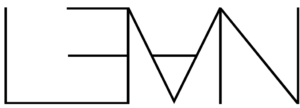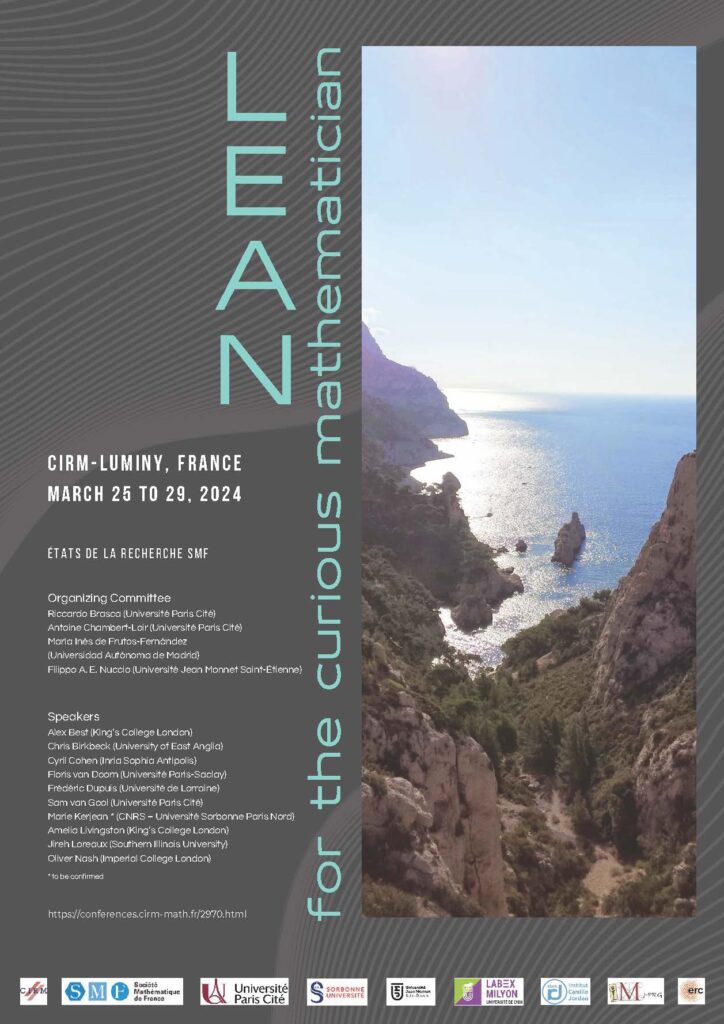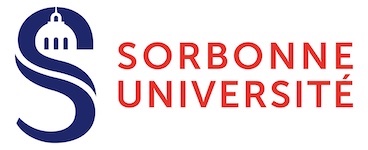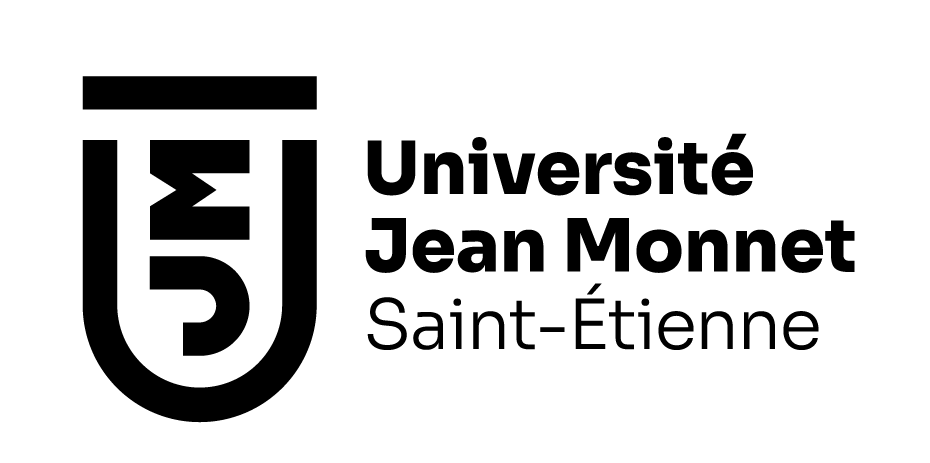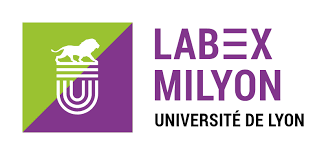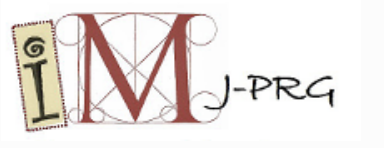Scientific Committee
Comité scientifique
Anne Baanen (Vrije University Amsterdam)
Johan Commelin (University of Freiburg)
Sébastien Gouëzel (CNRS – Université Rennes 1)
Heather Macbeth (Fordham University)
Assia Mahboubi (INRIA Rennes Bretagne Atlantique)
Organizing Committee
Comité d’organisation
Riccardo Brasca (Université Paris Cité)
Antoine Chambert-Loir (Université Paris Cité)
María Inés de Frutos Fernández (Autonomous University of Madrid)
Filippo A. E. Nuccio Mortarino Majno di Capriglio (Université Jean Monnet Saint-Étienne)
The conference will start on monday by 9:00 AM and will finish on friday by 12:30 AM.
Formalisation is the process of digitalising mathematical results, teaching them to a computer. It has several benefits, the most obvious being the verification of the correctness of theorems beyond any reasonable doubt, starting from the axioms. Formalisation is becoming a more and more popular activity for mathematicians. The existence of huge libraries of formalised mathematics will have an important impact in the daily life of the working mathematician, who will soon be able to formalise their own research and have databases of theorems, rather than databases of papers. In the next few years, computer programs for formalization — called proof assistants — will also be able to help in mathematical research, taking care of “routine” calculations and similar problems.
Many proof assistants can be used to formalise mathematics. Two of the most commonly used today by “standard mathematicians” are Lean and Coq, and the conference will mainly focus on the first. Lean comes with a vast library of formalised mathematics, mathlib. The existence of such a library allows one to work on contemporary mathematics. For example, one spectacular recent result has been the formalisation, by Commelin, Topaz and several other people, of one of the main results by Clausen and Scholze about condensed mathematics. This is cutting edge mathematics, using several theories, from functional analysis to homological algebra.
The meeting’s main goal is to introduce mathematicians to Lean and to formalisation in general. There will be several talks, given by Lean experts, to explain the basics and provide examples, as well as many “practice sessions”, where participants will use Lean in real world situations. Taking advantage of the presence of many French scientists working in Coq, we also plan to invite some of them to offer three or four talks about this other proof assistant, mainly discussing differences, similarities and potential collaborations. The conference’s focus will at any rate be about formalising “standard mathematics”, and in particular it will neither be about foundations of mathematics nor programming. At the end of the week people will have drafts of results that can soon be included into mathlib, tangibly contributing to the development of formalised mathematics. We expect that the conference will enable people to start formalising modern mathematics, and their own research in the near future. Lean for the Curious Mathematician 2024 will be part of the series États de la Recherche SMF of the French Mathematical Society.
Le but principal du colloque sera de proposer une introduction à Lean et à la formalisation en général à l’intention de des chercheurs et chercheuses en mathématiques. La formalisation mathématique est le processus de numérisation de résultats mathématiques — il s’agit en quelque sorte d’expliquer des mathématiques à un ordinateur. Parmi les intérêts d’un tel travail, le plus évident, et celui qui est le plus souvent mis en avant, est la vérification de l’exactitude des preuves au-delà de tout doute : l’ordinateur garantit l’enchaînement logique des démonstrations à partir des premiers axiomes. Ce thème gagne actuellement de l’importance et on peut penser que l’existence de grandes bibliothèques numériques de mathématiques formalisées aura un impact croissant dans le travail des mathématiciens et mathématiciennes, dès lors qu’il met à leur disposition une vaste collection de théorèmes vérifiés, plutôt qu’une base de données d’articles dont les arguments sont parfois insuffisants. Dans les années à venir, les « assistants de preuve », les logiciels de formalisation, pourront également aider les mathématiciens et mathématiciennes dans leur démarche de recherche, en accomplissant des tâches routinières de calcul ou de raisonnement basique.
De nombreux assistants de preuve permettent aujourd’hui de formaliser des mathématiques. Parmi les plus répandus à l’heure actuelle, en particulier pour le développement des « mathématiques classiques », on trouve Coq et Lean, et la conférence se concentrera principalement sur le second. La bibliothèque mathlib est la collection principale des mathématiques formalisées en Lean et elle est déjà très vaste. L’existence d’une telle bibliothèque permet de formaliser des mathématiques modernes de façon efficace. Par exemple, un résultat spectaculaire récemment obtenu est la formalisation par Commelin, Topaz et leur équipe d’un des résultats principaux de Clausen et Scholze sur les mathématiques condensées. Il s’agit de mathématiques profondes et récentes, qui nécessitent de plusieurs théories qui vont de l’analyse fonctionnelle à l’algèbre homologique.
La conférence sera centrée autour de la formalisation de mathématiques « classiques » plutôt qu’autour des fondements des mathématiques ou des langages de programmation. Plusieurs exposés, donnés par des experts de Lean, constitueront une présentation des concepts de base et des exemples principaux.
Nous prévoyons aussi des séances d’exercice et d’entraînement où les utilisateurs seront amenés à utiliser Lean pour formaliser des énoncés classiques. En nous appuyant sur la présence en France de nombreux collègues travaillant en Coq, nous prévoyons aussi d’en inviter certains à présenter trois ou quatre exposés centrés sur cet autre assistant de preuve, principalement afin de discuter des différences, des similitudes et des échanges possibles parmi les communautés.
Les projets de formalisation débutés au cours de cette semaine pourront, à terme, être intégrés dans mathlib. De la sorte, les participantes et participants auront pu participer de manière concrète au développement des mathématiques formalisées. Nous escomptons que la conférence permette à plus de mathématiciennes et mathématiciens de formaliser des mathématiques modernes, voire les inciter à formaliser leurs propres travaux.
Lean pour mathématiciens 2024 est une conférence de la série États de la Recherche SMF.
SPEAKERS
Vincent Beffara (CNRS Université Grenoble Alpes) Lean 2
Alex Best (King’s College London) Basic tactics
Chris Birkbeck (University of East Anglia) Algebra and Number Theory
Cyril Cohen (Inria Sophia Antipolis) Trocq: Proof Transfer for Free, With or Without Univalence
Floris van Doorn (Université Paris-Saclay) Instances and Classes
Frédéric Dupuis (Université de Lorraine) Advanced tactics
Sam van Gool (Université Paris Cité) Stone duality and its formalization
Marie Kerjean (CNRS – Université Sorbonne Paris Nord) Coq/Rocq Tutorial: ssreflect tactics and the MathComp library
Amelia Livingston (King’s College London) Logic
Jireh Loreaux (Southern Illinois University) Working with Mathlib
Oliver Nash (Imperial College London) Topology and Analysis


